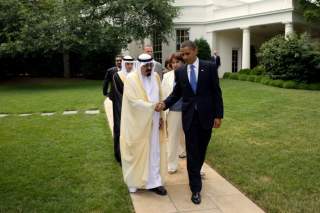Time for a U.S. Regional Strategy in the Middle East
"The major threats in the Middle East today are regional in scope, transcend state boundaries and defy state-specific solutions."
Third, action should be taken to support one or more of the specific economies. Given the massive economic needs, resource constraints, and the fact that political unrest and civil wars in Syria and Iraq must first be quieted before economic remedies can realistically be acted upon, it will be important to set priorities. Egypt should clearly be a priority, as mentioned in pillar two of the strategy. While it is divided politically between secularists and Islamists, compared to other countries with economic problems, like Yemen, Syria and Iraq, Egypt appears to be less unstable. And as the most populous country in the Arab world with nearly a quarter of the world’s Arab population, grounding its political recovery in deep economic reforms is essential. The quicker Egypt recovers, the more constructive a political role it can play in the region.
Conclusion
There is plenty at stake in correctly calibrating a U.S. strategy for the Middle East. Perceptions of Washington as weak, disengaged and confused abound in many parts of the Middle East. Part of this comes from murky messaging and unfortunately timed missteps on the part of the current administration. But part of the problem comes from the fact that the United States is operating with a tired, anachronistic strategy cast at the wrong strategic level. By engaging on the ground in individual conflicts, it is trying to manage the unmanageable.
Of course, the United States cannot, and should not, completely disengage from these individual conflicts. However, a shift towards a higher-level regional strategy, which includes using both political and economic instruments of power, would serve the United States and the region well. It would play to U.S. strengths and focus its efforts on exercising its strategic levers to share the onus for solving the region’s most dangerous problems with the region’s major powers. For while the major powers are divided on many issues, they are also bound by powerful common interests, including the need to have a politically stable and economically prosperous region. And to create regional economic sustainability, the United States could work with regional actors and global financial institutions to ground political stability and security in economic prosperity. The stakes for the United States, the region, and the international community are too high to do otherwise.
Ross Harrison is on the faculty of the Walsh School of Foreign Service at Georgetown University, where he teaches strategy. He also teaches Middle East politics at the University of Pittsburgh, and is a frequent contributor of articles on strategic issues facing the Middle East. He is the author of Strategic Thinking in 3D: A Guide for National Security, Foreign policy and Business Professionals (Potomac Books: 2013)
Shahrokh Fardoust is a senior economic consultant with 30 years’ experience in development, having worked with the World Bank, the United Nations, as well as private international firms and foundations. From 2008 to 2011, he was Director, Strategy and Operations, in Development Economics Vice Presidency, at the World Bank, where he contributed to the research and policy priorities of the Chief Economist, and the G20’s development agenda. He is co-editor of Towards a Better Global Economy: Policy Implications for Global Citizens Worldwide in the 21st Century (Oxford University Press, forthcoming in 2014).

